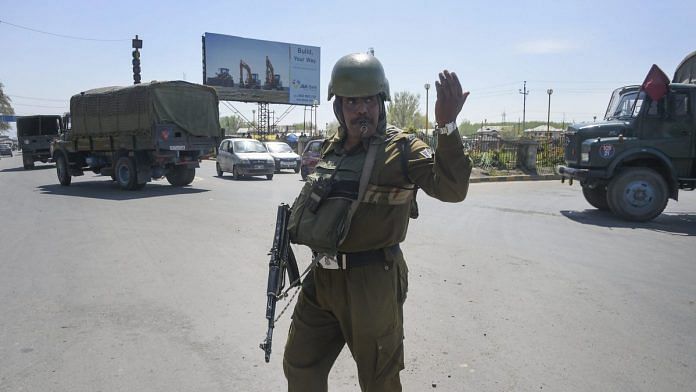New Delhi: Former IAS officer Shah Faesal, now looking to contest the Lok Sabha election, has moved the Jammu & Kashmir High Court against the state government’s two-days-a-week, dawn-to-dusk bar on civilian movement on the Jammu-Srinagar highway.
The high court has allowed the plea and Chief Justice Gita Mittal will hear the plea at the end of the day Monday.
In his plea, Faesal has argued that the 3 April order announcing the ban violates the fundamental rights of citizens, including those to life, health, education and livelihood.
“The imposition of a blanket ban on the movement of all civilians for two continuous days in a week cannot be said to be in the public interest. In fact, it serves no public interest. It causes more harm than serving any common good,” he adds.
Brought in the wake of the 14 February Pulwama attack that killed 40 CRPF personnel on the highway, the ban kicked in Sunday and will be in effect till 31 May.
The national highway from Baramulla through Srinagar, Qazigund, Jawahar Tunnel, Banihal and Ramban till Udhampur is the only all-weather road connection between Kashmir and the rest of the country.
Faesal has said that the order is illegal since the state administration, currently led by the governor, passed it without the appropriate jurisdiction. The administration has “illegally acted as the extra-ordinary magistrate of the state. Hence the order deserves to be quashed”, the plea adds.
According to Faesal, in the “last thirty years of conflict never has such extra-ordinary and illegal restriction been placed on the movement of civilian population”.
“The order reflects lack of understanding of the ground situation and if the state had utilised the additional train service or staggered the timing of force’s convoys there would not have arisen the need to pass such an order in the first place,” it states.
Faesal, 35, is the first Kashmiri to have ever topped the civil services exam, acing it in 2010 to enter the Indian Administrative Service (IAS). He went on to become a prominent social media voice with his pointed comments on contemporary issues, including Kashmir, and eventually quit the civil services this January to float his own political outfit — the Jammu and Kashmir People’s Movement (JKPM).
Also read: Kashmiris sense echoes of Palestine in highway ban, alienation with Delhi spikes
‘Enhances risk’
A blanket ban on the movement of civilian traffic on the highway, Faesal has argued, does not fully and completely guarantee the purpose for which the order has been “purportedly issued, i.e. fool-proof security and safety of security personnel”.
“It rather enhances the risk,” he adds.
“From a reasonable point of view, while balancing security of armed personnel and rights of citizens, it would be appropriate if, instead of placing a blanket ban on the movement of civilian traffic, the respondents provide alternate [sic] means of travel to the security forces such as a dedicated train service; consider night travel with adequate lighting facilities for the security forces convoys; consider the use of adequate technology to ensure the safety of security personnel,” he states.
The order not only impacts employees, students, patients and the general public at large adversely, it also amounts to “undeclared curfew for two days a week”, he adds.
Such a government order, he states, does not seem to address its effect on the masses, “the miseries and inconvenience that it would cause to the general public”, and, therefore, deserves to be quashed.
Though the government order provides for special travel permissions on a case-to-case basis, Faesal states the guarantee is not “enough to safeguard [citizens’] rights”.
“The government order is not clear and is vague about the procedures to be followed in medical emergencies,” he adds.
According to the plea, the order will also affect the nearly 1.2 million schoolgoing children of the Kashmir division, “who won’t be able to attend school on Wednesdays because there is no provision for movement of school buses and teaching staff on the banned highway”.
The order bars the highway to civilian movement throughout its 270-km stretch, which runs through Kashmir. This means that school buses would have to stay off the roads, and students out of schools on the days the ban is in effect.
Also read: J&K restricts civilian vehicle movement on national highway after Pulwama, Banihal attacks




When it comes to Kashmir, neither the law nor logic works. What seems to be changing is that there is no longer even a sincere effort or desire to make things better. 2. Watching Truth vs Hype, the thought struck me, Shri Sharad Pawar is a statesman like figure in India’s public life. What if he were to head a group of senior people tasked with finding some workable solutions. Not a defining end, for that would covet Pakistan and other delicate subjects, but putting an end to the dangerous drift that is taking the people emotionally away from India. When I shared the thought, wife told me, Kya, Ashok, people who have line responsibility spend their days on Twitter, who will entrust such a major responsibility to an outsider.
These is not a traitor bigger than this Shah Faesal. His father was killed by Muslim terrorists in a truly Islamic act. Yet he sticks to islam and opposes Hindus. Hinduism is a solution to the disease called islam.